#childhoodcancer
Text
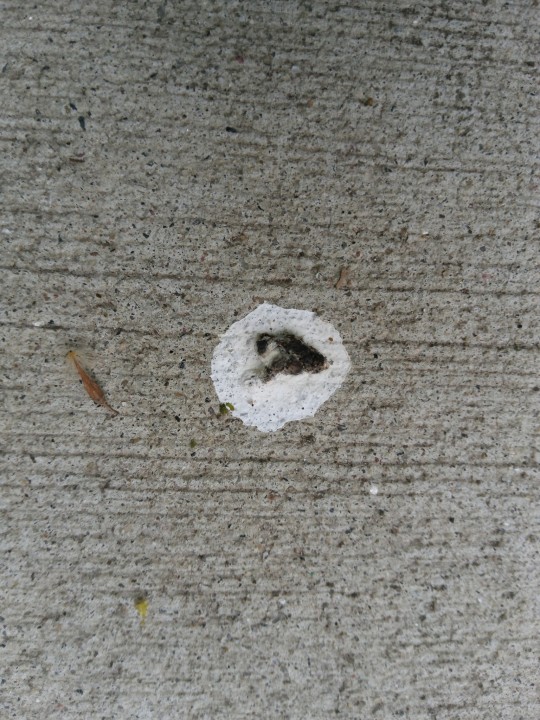


These tulipos and a dropping that I saw with my own eyes a bird produce. How enchanting !!
4 notes
·
View notes
Text
.
2 notes
·
View notes
Text
Pediatric Oncology: Common Cancer In Children’s Care And Treatment
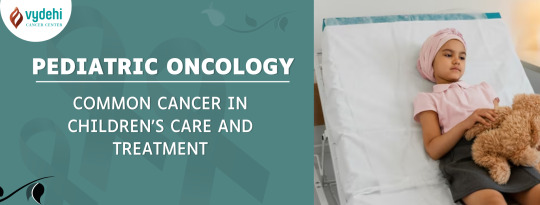
Understanding, Common Childhood Cancers and Treatments
Pediatric oncology, including pediatric leukemia, pediatric brain tumors, and other common cancers in children requires specialized care and treatment. It is a challenging road for children and their families.
In this blog, explore and learn about pediatric cancer, understand the different forms in which pediatric oncology manifests, know how we diagnose it and learn about the treatments we offer and the remarkable success stories we’ve witnessed at VCC.
What is Pediatric Cancer?
Pediatric cancer, also known as childhood cancer, is a term that no parent ever wants to hear. It’s when a child’s body begins to grow abnormal cells that can turn into cancer. These cancers can affect various parts of the body, and they are indeed challenging to deal with.
Different Types of Pediatric Cancers
Pediatric cancers come in various forms, including acute leukemias, lymphomas, kidney cancers, and more. Two of the most common ones are pediatric leukemia and pediatric brain tumors. These are formidable opponents that need our full attention.
Acute leukemias are a group of cancers that can grow rapidly in the blood and bone marrow. Within this group, there’s pediatric acute lymphoblastic leukemia, where abnormal white blood cells multiply quickly. It’s like a fierce battle, but it’s one we can win.
Lymphomas affect the lymphatic system, and they can be Hodgkin lymphoma or non-Hodgkin lymphoma. Yes, they can even affect young warriors.
Kidney cancers, although less common in children, can still happen. It’s like an unexpected twist in the story, but it’s a story we can rewrite.
Understanding these possible pediatric cancers is crucial because it helps us identify them early and take action. Vydehi Cancer Center specializes in diagnosing and treating all these types, and we’ve seen countless brave children fight and win these battles.
How We Figure It Out at VCC
At Vydehi Cancer Center, we know that every dhildhood cancer situation is unique. That’s why we use a variety of methods to find out what’s happening. We start with some general tests, like checking the blood to see if there’s anything unusual.
In case there is any suspicion or no clarity, we need dig deeper, and use special tests like bone marrow aspirations, flow cytometry, and cytogenetics. This is to provide the best possible diagnostic which is really helpful not only in early stage cancer detection but also for proper and complete treatment.
How We Fight It at VCC
Now, let’s talk about the part that matters most – fighting back. At Vydehi Cancer Center, we offer different ways to battle pediatric cancers. Our main weapons are chemotherapy and radiotherapy, which we use depending on the type of cancer and how far it’s spread.
In some cases, when it’s like a mighty dragon that needs to be vanquished, we might recommend a bone marrow transplant. But don’t worry, we’re here every step of the way, supporting you and your child.
Our Success Stories at VCC
At Vydehi Cancer Center, we are incredibly proud of our success rates. We’ve seen our young warriors win battles with pediatric cancer, achieving an impressive overall success rate of 70-80 percent. And when it comes to pediatric leukemias, our success rate soars to an incredible 90 percent. These are real stories of triumph, and we’re honored to be part of them.
In conclusion, pediatric cancer is a challenging journey, but it’s one that can lead to victory. Vydehi Cancer Center, with its focus on pediatric oncology and remarkable success stories, stands as a source of hope for children and families on this path. If your child is facing pediatric cancer, remember, that you’re not alone, and Vydehi Cancer Center is here to walk this journey with you.
#vydehicancercenter#cancertreatment#childhoodcancer#childhoodcancerawareness#pediatriccancer#leukemia#childhoodcancersucks#childhoodcanceradvocate
0 notes
Text
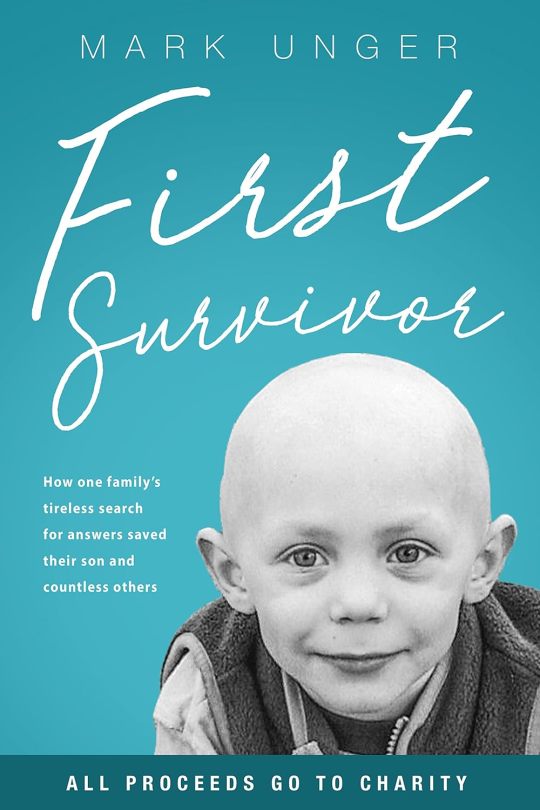
Book of the Day, April 19th -- Nonfiction, Rated 5/5 stars
Temporarily Discounted! Get your copy below:
https://forums.onlinebookclub.org/shelves/book.php?id=446549
First Survivor: The Impossible Childhood Cancer Breakthrough by Mark Unger
This book has earned multiple PERFECT 5-star ratings from Onlinebookclub.org Reviewers, and has 264 five-star ratings on Amazon!
----------
This first book by father and author, Mark Unger, was born from his burning desire to document their incredible journey of heartbreak and ultimate triumph.
All proceeds from this book will go to the Carrot Seed Foundation. Mark and his wife started this foundation to help find a cure for neuroblastoma and to support the children and families who are stricken by this disease.
"With raw honesty and profound emotion, Unger's book invites readers into the innermost depths of the family's experience, laying bare the hopes, fears, and unwavering love that sustained them through the darkest of times. " ~ OBC reviewer, Salome Ogani
https://forums.onlinebookclub.org/shelves/book.php?id=446549
0 notes
Text
Biggest life change: I am crawling out of the rubbles of my ex husband I was with on and off for 8 years and have to coparent our girls until I can raise lawyer money. I went from the stay at home parent of 5-8 years following his military career. Our oldest daughter, Luna has cancer and he left me for another woman during this time. I was her home school teacher to keep her safe and then he and his girlfriend he’d been cheating on me with illegally abducted the kids while I was out at a doctor appointment and my roommate was watching them. I never even met her and she took my kids from their natural home of five years and stuffed them in her storage closet. I came home to find them gone and messages saying they won’t be back with me. The screams that interrupted my body, the neighbors, the cops, will never go away. The girls are in therapy because of him. I had no lawyer and his mommy paid for his so it cane down to money. The kids prefer to be with me and voice it all the time to me and their dad and he shrugs them off. My working theory is he doesn’t care about having them during the week, he just wants to continue controlling me like a puppet. I would appreciate any love and prayers of any sort and donations and sharing for our lawyer gofundme I will attach. The quicker the better. My lawyer will eat his for advising he abduct the kids on that technicality alone, so I’m confident I just need help raising the funds. Please share everything. https://gofund.me/15afcced
0 notes
Text

Hoy, en el Día Internacional del Cáncer Infantil, unámonos en solidaridad para generar conciencia y apoyo a todos los jóvenes valientes que luchan contra el cáncer en todo el mundo. El cáncer infantil afecta a millones de familias y es crucial seguir abogando por mejores tratamientos y recursos. Juntos, podemos marcar la diferencia y garantizar que todos los niños que enfrentan este desafío se sientan amados, apoyados y empoderados. Difundamos esperanza, amor y fortaleza hoy y todos los días.
#krishparhealthcare#InternationalChildhoodCancerDayy#Guatemalacity#FightLikeKid#ChildhoodCancerAwareness#childhoodcancer#cancer#hospital#Guatemala
0 notes
Text

Hoy, en el Día Internacional del Cáncer Infantil, unámonos en solidaridad para generar conciencia y apoyo a todos los jóvenes valientes que luchan contra el cáncer en todo el mundo. El cáncer infantil afecta a millones de familias y es crucial seguir abogando por mejores tratamientos y recursos. Juntos, podemos marcar la diferencia y garantizar que todos los niños que enfrentan este desafío se sientan amados, apoyados y empoderados. Difundamos esperanza, amor y fortaleza hoy y todos los días.
.
.
#krishparcare#InternationalChildhoodCancerDayy#FightLikeAKid#ChildhoodCancerAwareness#childhoodcancer#cancer#hospital
0 notes
Text

International Childhood Cancer Day (ICCD) is observed annually on February 15th to raise awareness about childhood cancer and to express support for children and adolescents with cancer, survivors, and their families. This day serves as a reminder of the importance of early detection, diagnosis, and treatment of pediatric cancers, as well as the need for continued research, funding, and support for those affected.
The ICCD provides an opportunity to highlight the unique challenges faced by children with cancer and their families, including the emotional, financial, and psychological burdens associated with the disease. It also aims to advocate for improved access to quality healthcare services, specialized treatment centers, and psychosocial support for pediatric cancer patients and survivors worldwide.
#ICCD#ChildhoodCancerAwareness#GoldRibbon#KidsWithCancer#ChildhoodCancer#FightChildhoodCancer#CancerFreeKids#CureChildhoodCancer#MoreThan4#GoGold#ChildhoodCancerSupport#HopeForKidsWithCancer#PediatricCancerAwareness
0 notes
Text
Dr Fidaa
Dr. Fidaa Wishah, a distinguished pediatric radiologist, specializes in the intricate field of pediatric astrocytoma radiology. With a wealth of experience and a commitment to providing the highest standard of care for young patients, Dr. Wishah plays a crucial role in diagnosing and treating pediatric astrocytoma, a type of brain tumor that occurs primarily in children.
In the realm of pediatric radiology, Dr. Fidaa Wishah stands out for her expertise and dedication. She employs advanced imaging techniques to examine and analyze astrocytomas in pediatric patients, ensuring accurate and timely diagnoses. Her compassionate approach to working with children and their families sets her apart, creating a supportive environment during what can be a challenging time for both patients and caregivers.
Pediatric astrocytoma radiology involves the use of cutting-edge technologies such as magnetic resonance imaging (MRI) and computed tomography (CT) scans. Dr. Wishah leverages these tools to visualize and understand the intricacies of astrocytomas in children, enabling her to develop tailored treatment plans that prioritize the well-being and recovery of her young patients.
Understanding the unique challenges posed by pediatric astrocytoma, Dr. Fidaa Wishah collaborates closely with a multidisciplinary team of healthcare professionals. This collaborative approach ensures comprehensive care, considering not only the radiological aspects but also the broader medical and emotional needs of the child and their family.
As a pediatric radiologist, Dr. Wishah is dedicated to staying at the forefront of her field. She actively engages in research and continuing education, contributing to advancements in pediatric astrocytoma radiology. This commitment to ongoing learning reflects her passion for improving outcomes and enhancing the quality of life for children affected by astrocytomas.
In summary, Dr. Fidaa Wishah's expertise in pediatric astrocytoma radiology, combined with her compassionate approach, makes her a trusted and invaluable resource for families facing the challenges of childhood brain tumors.
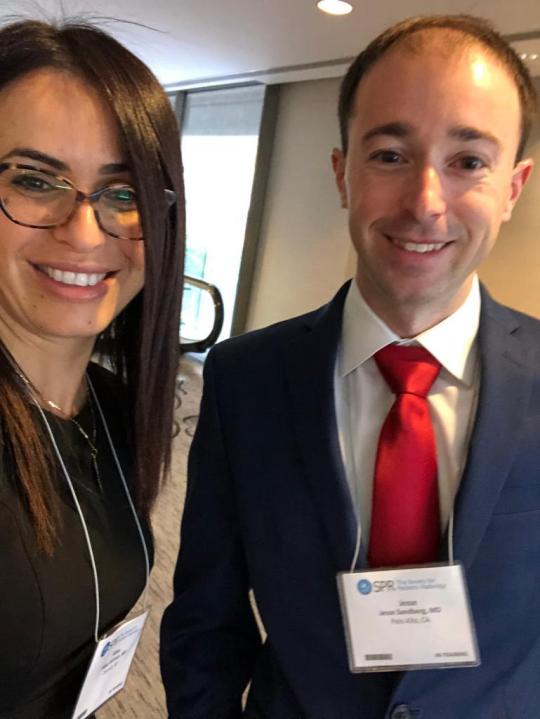
#DrFidaaWishah#PediatricRadiology#Astrocytoma#PediatricHealth#MedicalExpertise#ChildhoodCancer#RadiologyCare#HealthcareInnovation
0 notes
Link
Day 3 - CHILDHOOD CANCER
Special Guests:
Maria Richardson | Writer, Speaker, Childhood Cancer Advocate, BWCC Member
Black Women Connexting Communities
Season 4 EP 6
0 notes
Link
Childhood leukemia is a type of cancer that affects children and adolescents. It is a serious illness that requires prompt medical attention. Early diagnosis and treatment can increase the chances of survival. The symptoms of childhood leukemia can be vague and nonspecific. They may include fatigue, fever, and bruising. It is important to be aware of these symptoms and to seek medical attention if they persist. Personal stories of children and families affected by childhood leukemia can be powerful and inspiring. They can provide hope and encouragement to others who are going through similar experiences. Let's explore some of these stories and learn more about this devastating disease. 💪🏼🧒🏻🎗️1. Understanding Childhood Leukemia: Types, Causes and Risk FactorsChildhood leukemia is a type of cancer that affects the blood and bone marrow. There are four main types: Acute Lymphoblastic Leukemia (ALL), Acute Myeloid Leukemia (AML), Chronic Lymphocytic Leukemia (CLL), and Chronic Myeloid Leukemia (CML). The exact causes of childhood leukemia are unknown, but some risk factors include exposure to radiation, certain genetic disorders, and a weakened immune system. Symptoms of childhood leukemia may include fatigue, fever, frequent infections, and easy bruising or bleeding. Early diagnosis and treatment are crucial for a successful outcome. Treatment options for childhood leukemia may include chemotherapy, radiation therapy, stem cell transplantation, and targeted therapy. The type of treatment depends on the type and stage of leukemia. It's important to remember that childhood leukemia is a rare disease, and most children with leukemia survive and go on to live healthy lives. With early detection and proper treatment, the chances of a full recovery are high. 🙌2. Early Symptoms of Childhood Leukemia: What Parents Should Look Out ForChildhood leukemia is a type of cancer that affects the blood and bone marrow. Here are some early symptoms that parents should look out for: Unexplained fever Frequent infections Fatigue and weakness Loss of appetite and weight loss Bruising or bleeding easily Bone pain or tenderness Swollen lymph nodes If your child has any of these symptoms, it's important to see a doctor as soon as possible. Early detection and treatment can improve the chances of a successful outcome. Leukemia can be difficult to diagnose because the symptoms can be similar to those of other illnesses. Your doctor may order blood tests, bone marrow tests, or imaging tests to confirm a diagnosis. There are different types of childhood leukemia, and the treatment will depend on the type and stage of the cancer. Treatment options may include chemotherapy, radiation therapy, and stem cell transplant. It's important to remember that childhood leukemia is a rare disease, and most children with symptoms like these will not have leukemia. However, it's always better to be safe than sorry when it comes to your child's health. 👀 Keep an eye out for these symptoms and don't hesitate to talk to your doctor if you have any concerns about your child's health. Early detection can save lives! 👍3. Diagnosis and Treatment of Childhood Leukemia: Medical Procedures and Therapies🩺 Medical procedures for diagnosing childhood leukemia include blood tests, bone marrow aspiration, and biopsy. Imaging tests like X-rays, CT scans, and MRI may also be used. 💊 Treatment options for childhood leukemia depend on the type and stage of the cancer. Chemotherapy, radiation therapy, and stem cell transplant are common therapies. 👨⚕️ Chemotherapy involves the use of drugs to destroy cancer cells. Radiation therapy uses high-energy radiation to kill cancer cells. Stem cell transplant replaces damaged bone marrow with healthy cells. 💉 Side effects of treatment may include hair loss, nausea, and fatigue. Regular check-ups and monitoring are important to ensure the cancer is in remission. 👶 Children with leukemia may also receive supportive care like blood transfusions, antibiotics, and pain management. A multidisciplinary team of healthcare professionals is necessary for optimal treatment.4. Coping with Childhood Leukemia: Emotional Support for Families and PatientsChildhood leukemia can be emotionally challenging for both patients and families. Here are some tips for coping: Join a support group for families of children with leukemia Consider therapy or counseling for emotional support Stay positive and focus on the present moment Take care of yourself physically and emotionally It's important to remember that it's okay to feel overwhelmed and seek help. Don't hesitate to reach out for support. 🌟👨👩👧👦💪5. Personal Stories of Childhood Leukemia Survivors: Inspiration and Hope Meet some childhood leukemia survivors and hear their inspiring stories of hope and perseverance. These survivors have overcome incredible obstacles and are living proof that leukemia can be beaten. 🌟 Sarah, diagnosed at age 6, is now a college graduate and advocate for childhood cancer research. 🌟 Miguel, diagnosed at age 4, is now a successful artist and uses his platform to raise awareness for childhood cancer. 🌟 Emma, diagnosed at age 9, is now a nurse and works with pediatric cancer patients. These survivors have faced unimaginable challenges, but their strength and resilience have inspired many. Their stories offer hope to those currently battling leukemia and their families. 🌟 Alex, diagnosed at age 8, is now a motivational speaker and shares his story to inspire others. 🌟 Grace, diagnosed at age 7, is now a college athlete and uses her platform to raise awareness for childhood cancer. 🌟 Adam, diagnosed at age 3, is now a successful businessman and donates a portion of his profits to childhood cancer research. These survivors have not only survived leukemia, but they have thrived. Their stories show that there is life after cancer and that anything is possible with determination and a positive attitude. 6. Childhood Leukemia Research: Current Discoveries and Future DirectionsRecent research has uncovered new insights into the causes and treatment of childhood leukemia. Scientists have identified genetic mutations that increase the risk of developing the disease. New therapies, such as CAR-T cell therapy, have shown promising results in clinical trials. Researchers are also exploring the use of immunotherapy and targeted therapies to treat leukemia. Future directions in childhood leukemia research include: Developing personalized treatments based on a patient's genetic profile. Investigating the role of the microbiome in leukemia development and treatment. Studying the long-term effects of treatment on survivors. Overall, the progress in childhood leukemia research offers hope for improved outcomes and quality of life for patients and their families. 🌟7. Childhood Leukemia Awareness: Advocacy and Education for a CureChildhood leukemia is a type of cancer that affects children's blood and bone marrow. It is the most common cancer in children under the age of 15. Advocacy and education are crucial in raising awareness about childhood leukemia. The more people know about it, the more support and funding can be directed towards finding a cure. There are different types of childhood leukemia, including acute lymphoblastic leukemia (ALL) and acute myeloid leukemia (AML). Treatment options depend on the type and stage of the cancer. Advocacy efforts include lobbying for increased funding for research and treatment options, as well as raising awareness about the signs and symptoms of childhood leukemia. Education efforts involve providing information to parents, caregivers, and healthcare providers about childhood leukemia, including risk factors, treatment options, and support resources. Childhood leukemia can have a significant impact on families. Support groups and resources can help families cope with the emotional and financial challenges that come with a cancer diagnosis. There is hope for a cure. Research and clinical trials are ongoing, and new treatments are being developed. Increased awareness, advocacy, and education can help us get closer to finding a cure for childhood leukemia. 🎗️ In conclusion, childhood leukemia is a serious disease that requires early detection and treatment. Parents should be aware of the early symptoms, such as fatigue, fever, and bruising. Remember, early detection can save lives. Personal stories from survivors and families affected by childhood leukemia can provide hope and inspiration. It's important to support research and organizations that help fund treatment and find a cure. Together, we can make a difference. 🎗️ Let's continue to raise awareness and support those affected by childhood leukemia. With ongoing research and advancements in treatment, we can improve the lives of children and families impacted by this disease. 💛 https://symptomfinder.com/childhood-leukemia-early-symptoms-personal-stories/?_unique_id=647f49b8a503f
#Uncategorised#childhoodcancer#Childhoodleukemia#childhoodleukemiatreatment#leukemiasurvivors#leukemiasymptoms#aiomatic_0
0 notes
Text
Tips on Coping with Your Child’s Cancer Diagnosis
Nobody ever expects to learn that their child has a potentially fatal illness. The first few weeks are a blur for most parents. When a child is diagnosed with cancer, parents face numerous challenges, especially in the first few weeks. Below are some tips on how parents can cope up with cancer diagnosis of their child-
Accept the New Normal-
Instead of focusing on getting back to your old life, try to focus on your "new normal." Allow yourself time to grieve, but then turn your attention to the present. Even if your family must find new ways to do things, it can be beneficial to find ways to help your child live life in these new circumstances. One way to do this is to look for small moments of joy and hope in your own and your child's lives.
Take Notes-
As your brain adjusts to the new diagnosis, you may not remember everything your Paediatric Cancer Doctor tells you, including important details about the disease and next steps to take. So make a note of key points from the conversation, such as the name of the specific cancer type and any additional information you receive from them at this time.
Don’t be afraid to ask Questions-
Do not be afraid to ask as many questions as you can think of. Because of the need for future tests and insights from a specialist, the information may be limited at the time of diagnosis, but it never hurts to ask. Questions to consider include:
What is the cancer stage?
What are the available treatment options?
What effect will the treatment have on my child's future development?
What are the names of the people who will be on my child's future cancer care team?
What will be the next step?
Make sure you understand what happens next before leaving the doctor's office, such as a follow-up appointment with the appropriate cancer specialist.
Research and Gather Information-
For some, research can provide peace and comfort. Reading about your child's cancer type can help you prepare for what to expect, understand the treatment recommended by your Paediatric Cancer Doctor, and ask the right questions when speaking with your child's doctors. Knowledge is power, and this is no different. Accurate and trustworthy information, including resources on your child's diagnosis, can help you and your family better understand the disease and what to expect in the future. It may also aid in reducing fear and anxiety.
Give some time for yourself-
Take the best possible care of yourself. Although it may not appear to be the appropriate time, taking care of yourself is one of the most important things you can do. When your health is not prioritised, it is more difficult to care for your child and be present in their care. Begin with simple activities such as: -
Exercise - Choose a method you enjoy, such as yoga, biking, or a long walk
Eat well - Consume what makes your body and mind feel good
Relax - Try to get those 7-8 hours of sleep -Read a book - Do something that allows your mind to escape
Deep breaths - Sometimes self-care is as simple as taking a cleansing breath.
Speak with Parents Who Have Had Similar Experiences-
There is strength in numbers. Even if you believe you are alone in this experience, there are people who are willing to talk you through it. They can share their strength and guide you through the cancer journey process, whether they are parents of a child who has or has had cancer, or have had cancer themselves.
Although this journey will be difficult, it does not mean that parents should not celebrate milestones, no matter how big or small, or that they cannot create a new normal with their children.
#pediatrician#pediatricsurgery#pediatriccare#pediatriccancer#pediatriccancerdoctor#pediatricsurgeon#cancercare#childhoodcancer#childcancer
0 notes
Text
#ariantors#arianagrande#lgbtq#elizabeth gillies#cat valentine#jade west#liz gillies#Victorious#cancer#childhoodcancer#GoGoldChildhoodcancer#Cade
0 notes
Text
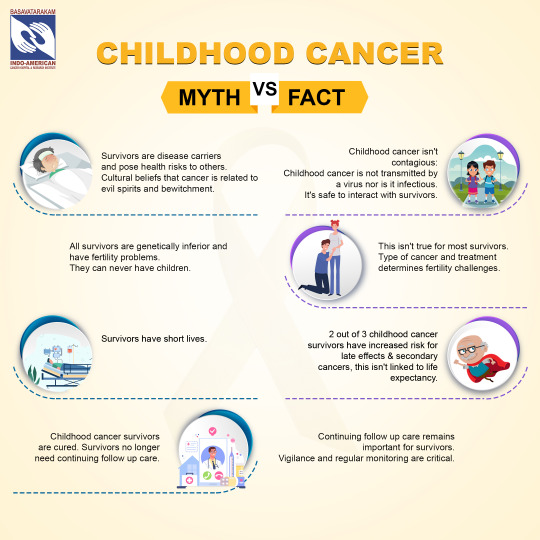
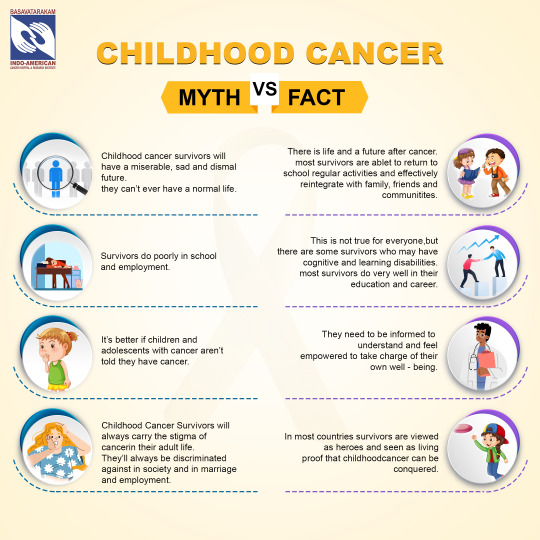
Childhood Cancer: Unfortunately, there are many myths and misconceptions about childhood cancer that can make the experience even more difficult. Here are some common myths and facts about childhood cancer:
Myth: Childhood cancer is rare. Fact: Childhood cancer is more common than many people think. In fact, cancer is the leading cause of death by disease in children under the age of 15 in the United States.
Myth: Childhood cancer is caused by something the child or parents did. Fact: The causes of childhood cancer are not fully understood, and in most cases, there is no known cause. It is not caused by anything the child or parents did.
Myth: Childhood cancer is contagious. Fact: Childhood cancer is not contagious. It cannot be caught like a cold or the flu.
Myth: Childhood cancer is always fatal. Fact: While some childhood cancers are difficult to treat and have a lower survival rate, many types of childhood cancer are treatable and curable. Early detection and treatment can greatly increase the chances of survival.
Myth: Childhood cancer is just like adult cancer. Fact: Childhood cancer is different from adult cancer in many ways. For example, childhood cancers tend to respond better to treatment and children's bodies can handle higher doses of chemotherapy than adults can.
Myth: Childhood cancer is only treated at specialized children's hospitals. Fact: While many children's hospitals specialize in the treatment of childhood cancer, treatment can also be provided at general hospitals and cancer centers.
Myth: Childhood cancer survivors do not experience long-term side effects. Fact: Many childhood cancer survivors experience long-term side effects from their treatment, including physical, emotional, and cognitive effects.
Myth: Childhood cancer research receives adequate funding. Fact: Childhood cancer research is significantly underfunded compared to other types of cancer research. More funding is needed to develop new and more effective treatments for childhood cancer.
In summary, childhood cancer is more common than many people think, it is not caused by anything the child or parents did, it is not contagious, it is treatable and curable, and survivors can experience long-term side effects. More funding is needed for childhood cancer research to improve treatment and outcomes for children with cancer.
#ChildhoodCancer#basavatarakam cancer hospital#basavatarakam#best cancer treatment in india#best cancer hospitals in india#basavatarakam hospital#indo american cancer hospital#best cancer hospital#indo american hospital#best cancer specialist in india#basavatarakamcancerhospital basavatarakam
0 notes
Text
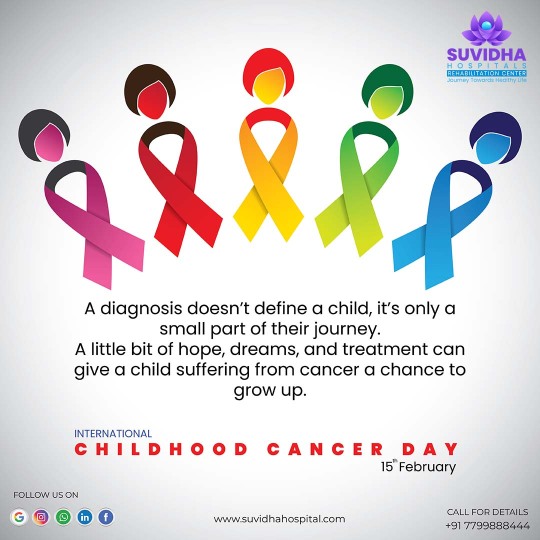
"Cancer is a journey that you must take alone." "There are many places to stop along the way and get nourishment—you just have to be willing to take it.” - Emily Hollenberg
Contact us for more information:
Suvidha Hospital
Hno 6-3-347/11/H/1 Plot no11, Dwarakapuri, Punjagutta, Hyderabad, Telangana 500082
Send us an email with your specifications at [email protected].
Visit: www.suvidhahospital.com
Mobile: 077998 88444
#cancer#childhoodcancer#surgery#generalmedicine#generalsurgeon#expertdoctors#criticalcare#pulmonaryrehabilitation#orthorehabilitation#neurorehabilitation#cardiacrehabilitation#rehabilitation#suvidharehabilitation#doctors#punjagutta#hyderabad#qualitycare#suvidhahospital#multispecialityhospital
0 notes
Text

New Hope for Cancer Patients. Trusted by Millions of People and High Success Rate for recovery.
MediGoCare, a leading medical tourism company in India, top facilitates an affordable quality treatment for International patients across the globe. We are affiliated with a huge network of world class cancer hospitals in India across all major cities and top cancer surgeons who are globally trained in advanced surgical techniques and provide you with outstanding surgical treatment and experience.
Our Services:-
Choosing the right doctor
Determination of hospital
Doctor's appointment
Medical visa invitation letter
Assistance in visa processing
Concept of cost of treatment
Telemedicine
Air tickets
Tickets of Indian Railways
Assistance in post-treatment follow-up
For more information, visit our site:- https://medigocare.com/cancer-treatment
Call us:- +919085883067 or WhatsApp Us:- https://wa.me/message/G2MOQA66AJ2VB1
Email:- [email protected]
#MediGoCare#cancer#cancercare#cancerspecialist#cancerdiagnosis#cancercure#cancerprevention#oncology#oncologist#childhoodcancer#chemotherapy
0 notes